News Click to go to article
Dr. Mark Spare Joins Ashland Veterinary Center Ashland Veterinary Center Celebrates 30 Years in Business Searching for a Solution—Dr. Randall Spare discusses pinkeye and searches for solutions to prevent it without vaccine, by examining how the infection occurs We Don't Have a Shot for That—As calving season begins or is on the horizon, the most important management tools we have is nutrition, states Dr. Randall Spare I’m a Drover: Dr. Randall Spare is a Service–Minded Veterinarian Antibiotic Usage in Beef Production: We Can’t Forget People Dr. Randall Spare Presented Service to Industry Award by the Beef Reproduction Leadership Team Slow Down and Make a Better Plan (By Reducing Stress at Weaning Time) AVC Celebrates 25 Year Milestone 'Tis the (Heifer Calving) Season When Should You Call the Vet on a Difficult Calving? Why Genetic Credentials Matter in U.S. Beef Industry Dr. Randall Spare Recognized with Merial Excellence in Preventive Medicine Award at AABP AVC Earns Kansas Business and Professional Women's 2013 Small Business of the Year Award Veterinary Student Lacey Robinson Interns at AVC Dr. Randall Spare's Motto of "Success Breeds Success" Proven in Cow Herds AVC Customer Appreciation EventDr. Mark Spare Joins Ashland Veterinary Center
October 2022
Back to Top
Ashland Veterinary Center Celebrates 30 Years in Business
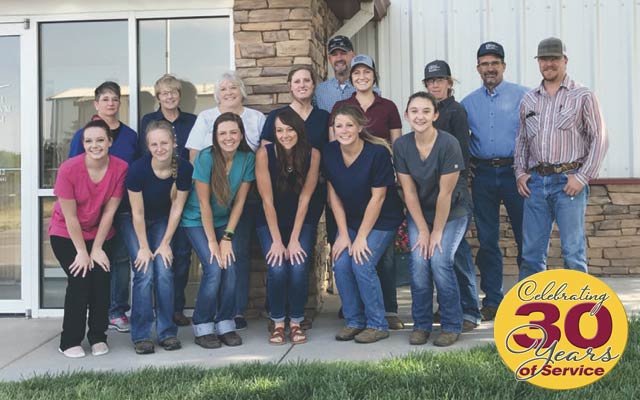 The AVC team front left to right: Hailey Weber; Tessa Vanderree; Libby Farney, DVM; Rhiannon Hazen; Lindsey Tarby; Bailey Preedy. Back left to right: Kelly Deewall, DVM, Debbie Filson; Debby Fox; Ashley Senn; Hayley Cooper; Ashley Fischer, DVM; Randall Spare, DVM; Nick Brown. Far back: John Kellenberger, DVM.
The AVC team front left to right: Hailey Weber; Tessa Vanderree; Libby Farney, DVM; Rhiannon Hazen; Lindsey Tarby; Bailey Preedy. Back left to right: Kelly Deewall, DVM, Debbie Filson; Debby Fox; Ashley Senn; Hayley Cooper; Ashley Fischer, DVM; Randall Spare, DVM; Nick Brown. Far back: John Kellenberger, DVM.
June 23, 2020
June 1, 1990, marked the first day of operation for the Ashland Veterinary Center in Ashland, Kansas. Randall Spare and his wife, Michelle, had recently purchased a struggling veterinary practice in rural Clark County and moved their young family to an area where cattle far outnumber people. As the practice grew and the need for another veterinarian became evident, Spare’s search for a like-minded partner resulted in the addition of John Kellenberger in 1996. In 2003, John became a partner in AVC.
Empirical data documents the odds for a small business in America, much less rural America, to succeed over decades is less than ten percent. Businesses that succeed over the long term have developed a culture of trust, service, integrity and professionalism. By keeping the goal of service and best-practice veterinary medicine as an overarching priority, Ashland Veterinary Center has grown and currently employs five full time veterinarians and two part-time veterinarians.
Time, advancing science and technology and the cyclical nature of food animal production have fueled remarkable industry-wide change. The AVC catchment area has evolved from largely stocker operations to predominantly cow-calf and seedstock operations. Today, AVC serves clients in 13 Kansas counties, five Oklahoma and two counties in Texas. The clinic provides small and large animal veterinary services in addition to comprehensive reproductive services for beef producers. The AVC team manages the herd health for some of the largest registered Angus seedstock producers in the U.S. as well as providing comprehensive services to commercial cow-calf producers and feedyards. The AVC bovine viral diarrhea (BVD) lab tests more than 30,000 samples each year to eradicate one of the costliest illnesses in beef production.
“Skin in the game” perspective has guided Spare and Kellenberger to seek practical, cost effective solutions helping producers leverage natural resources, human capital and creative management practices to capture the most value possible in their cow-calf operations. As new tools, such as genomic testing and advanced diagnostic testing become the norm, value-based marketing systems enable all producers access to better marketing channels. In a rapidly changing consumer environment, sustainable profit and equity preservation is challenging. The AVC team comes alongside producers, assists them in creative risk management using sound health protocols, nutritional guidance and genetic selections, in addition to a commitment to exceed the need of every client they serve.
Back to Top
Searching for a Solution
Dr. Randall Spare discusses pinkeye and searches for solutions to prevent it without vaccine, by examining how the infection occurs.
March 2020
F&R Livestock Resource
Dr. Randall Spare is a contributing writer to F&R Livestock Resource, a quarterly publication geared for progressive commercial beef producers.
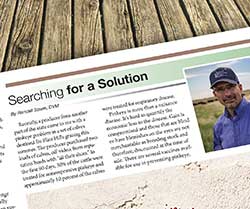
Recently, a producer from another part of the state came to me with a pinkeye problem in a set of calves destined for Flint Hills grazing this summer. The producer purchased two loads of calves, off the video, from reputation herds with "all their shots." In the first 90 days, 30% of the cattle were treated for nonresponsive pinkeye and approximately 10 percent of the calves were treated for respiratory disease.
Pinkeye is more than a nuisance disease. It's hard to quantify the economic loss to the disease. Gain is compromised and those that are blind or have blemishes on the eyes are not merchantable as breeding stock and therefore, discounted at the time of sale. There are several vaccines available for use in preventing pinkeye, but none are effective all the time.
We define "pinkeye" as keratoconjunctivitis. Simply stated, there is an infection involving the cornea and the surrounding tissues causing inflammation. Often this begins with an irritation or trauma to the cornea, followed by an infection resulting from an abrasion in the outer layer of the cornea. Subsequently, the eye is tearing, and the animal is attempting to keep the eye closed because of pain.
The most common bacteria is a strain of Morexella bovis. However, it is not uncommon during extremely contagious outbreaks, such as the producer's group of calves, to find 3-4 strains of bacteria involved in the same eye causing the problem. In fact, one or both eyes may be affected.
What caused the infection? What can we do to prevent it now and in the future? And how can we treat the active infection?
A wise, seasoned veterinarian once told me early in my career, "Seldom, when there is an outbreak of disease or death loss in cattle, is there only one cause. I remind myself of this constantly. Producers come to a veterinarian for answers to problems right now. As veterinarians, or diagnosticians, we are challenged to look for the root of the problem. What initiated the outbreak? I would love to give a "silver bullet" answer, but as a diagnostician, I am learning to ask lots of questions. Many times, the causes and solutions are multifactorial.
Back to TopWe Don't Have a Shot for That
Dr. Randall Spare discusses an analysis of commonly asked questions regarding conception rates upon the conclusion of fall 2019 fall work, including pregnancy testing.
January 2020
F&R Livestock Resource
Dr. Randall Spare is a contributing writer to F&R Livestock Resource, a quarterly publication geared for progressive commercial beef producers.
The fall herd work for us at Ashland Veterinary Center is coming to a close. As the calendar turns to 2020, one might think the next task on our minds is calving season, then evaluating bulls for the upcoming breeding season. Yes, this is true. However, now is when we gather data from the fall work of pregnancy evaluation and assessing body condition. These two data points are heavily correlated. The nutritional status of the cow herd the next few months through calving will affect your 2020 pregnancy rate and breeding distribution.
Our clients often asked, "How is the pregnancy rate this fall?" Or, "How are heifers breeding?" Many producers want to know how they compare with others, or what they can expect when their herds are palpated. In other words, the real question being asked is, what is the chance I will have an acceptable percent of cows bred in the breeding season? The question I then ask myself is, "Why do we leave so much to chance when it comes to conception and reproduction?"
Reproduction is a lowly heritable trait compared to other traits such as gain, marbling, ribeye area or even temperament within beef cattle. Another way to state this is that management, such as feeding and health, have a much greater effect on fertility in the cow herd than heritability.
Back to TopI’m a Drover: Service-Minded Veterinarian
January 18, 2019
Drovers.com
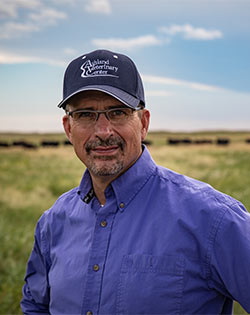 Photo by Grant Company
Photo by Grant Company
Having an understanding of what makes producers money is important for veterinarians, Spare says. “We understand that we need to be an investment, not a cost.”
Discussions on feedyard closeouts or how calves are weaning are common discussions with producers. He’s been able to develop those conversations after working 28 years at the same Ashland Veterinary Center Inc. (AVC) he established in Ashland, Kansas.
Back to TopAntibiotic Usage in Beef Production. We Can’t Forget People.
November 28, 2018
Presented by Dr. Randall Spare at the 2018 National Institute for Animal Agriculture’s Antibiotic Symposium
Watch his presentation.
Read the accompanying story, “One Health Series: Health and Wellness: A Veterinarian’s Perspective on Antibiotics” from Hoards.com.
Back to TopDr. Randall Spare Presented Service to Industry Award by the Beef Reproduction Leadership Team
September 1, 2017
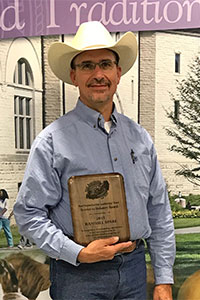 The Beef Reproduction Leadership Team presented
Dr. Randall Spare the Service to Industry Award Aug. 29 during the Applied
Reproductive Strategies in Beef Cattle Symposium (ARSBC) in Manhattan, Kansas. This
award recognizes outstanding contributions by individuals working in the artificial
insemination (AI) industry toward the application or increased use of AI and estrous
synchronization by beef producers.
The Beef Reproduction Leadership Team presented
Dr. Randall Spare the Service to Industry Award Aug. 29 during the Applied
Reproductive Strategies in Beef Cattle Symposium (ARSBC) in Manhattan, Kansas. This
award recognizes outstanding contributions by individuals working in the artificial
insemination (AI) industry toward the application or increased use of AI and estrous
synchronization by beef producers.
Spare, DVM from Ashland, Kansas, has dedicated more than a quarter century as a veterinary practitioner educating his clients relative to the value of genetic improvement through AI and estrous synchronization.
"Veterinarians making an impact in the areas of AI and estrous synchronization among commercial cow-calf producers are unconventional thinkers," says Mark Gardiner of Gardiner Angus Ranch, Ashland, Kansas. "Dr. Spare continually stresses the importance of client goals, total health and wellness, market access as well as risk tolerance in the context of accelerated improvements through AI and synchronization. Randall Spare has a true stake in his client's success. He has made the effort to have skin in the game by using all of this technology on his own operation, before applying it on theirs."
Under Dr. Spare's leadership, Ashland Veterinary Center offers comprehensive reproductive services in a four-state area surrounding Ashland. Today, the AVC team offers turnkey reproductive services. From semen sales, AI, fetal sexing and palpation, Dr. Spare is responsible for AI and synchronization of approximately 10,000 to 20,000 commercial females per year.
"From the first interaction with a client considering AI and synchronization, Dr. Spare is motivated to assist in accessing a value-added market. AI and synchronization schemes simply serve as a starting point for clients determined to make herd improvements," Gardiner adds. "AI and synchronization enable a client to take advantage of market timing. To further accelerate progress, Dr. Spare encourages clients to add genomic testing as a benchmarking tool, adding to the precision and progress of an AI and synchronization program. Any client willing to embrace Spare's enthusiasm for herd improvement through AI and synchronization will ultimately increase the opportunity for profitability and farm-to-fork sustainability."
More than 340 producers, veterinarians, and representatives from the artificial insemination (AI) and pharmaceutical industries were in attendance at the Applied Reproductive Strategies in Beef Cattle Symposium. The Beef Reproduction Leadership Team's mission is to optimize the productivity and improve the profitability of cow-calf operations by facilitating the adoption of cost-effective, applied reproductive technologies.
For more information about this year's symposium, visit AppliedReproStrategies.com.
Back to TopSlow Down and Make a Better Plan (By Reducing Stress at Weaning Time)
By Dr. Travis McCarty, formerly of Ashland Veterinary Center
September 17, 2015
Drovers.com
"Doc, my calves I just weaned are getting sick!"
When faced with this kind of unfortunate situation, with animals becoming ill and possibly even succumbing to death, we often try to overanalyze these events and want to blame a bottle of vaccine or antibiotic for the poor outcomes. Many emotions take over. Confusion, fear and sometimes anger are the typical human responses.
Customers are confused because they believe they are doing everything correct. They are afraid of the financial losses that have been occurring, and then sometimes they are just plain mad at the situation. We've all been there.
Instead of letting anger control your emotions, I would suggest that you slow the game down and remember there are basically two reasons why sickness and death occur.
Read more. Back to TopAVC Celebrates 25 Year Milestone
June 12, 2015

On the first day of June 1990, an aspiring veterinarian moved his young family to Ashland, Kansas, to assume ownership of a struggling veterinary clinic. The rural Clark County practice, geographically located in an area where cattle far outnumber people, spelled opportunity for Dr. Randall Spare.
Fast forward a quarter century and the Ashland Veterinary Center's (AVC) five veterinarians offer extensive services in a four state area. The clinic provides small and large animal services with the majority of AVC's work being large animal, including cow-calf, stocker and feedlot.
Herd health management, nutritional consulting, disease prevention and testing, genomic and reproductive services, equine reproduction and acupuncture are all services offered by the AVC team. The AVC bovine viral diarrhea (BVD) lab tests more than 30,000 samples each year in an effort to eradicate one of the most costly illnesses in beef production. In addition, AVC veterinarians and support staff are responsible for managing the requirements of international exports for cattle shipments to Russia, Canada, Mexico, Egypt and Kazakhstan.
Access to genomic information and a bullish economic environment for cow-calf producers have resulted in the growth of artificial insemination and the use of genomic technology. Today, AVC provides complete reproductive services, including synchronization, artificial insemination, genomic testing and semen sales on more than 5,000 head of cattle, for commercial and registered beef producers, each year.
Modern best practice veterinary medicine recognizes the importance of overall wellness and animal welfare, including pain management. The AVC team is sensitive to pain management and includes a certified veterinary acupuncturist for large and small animal treatment to administer alternative treatment as a therapeutic option. Cold laser therapy is relatively new technology used to promote healing and pain management.
As good citizens and responsible veterinarians, the AVC team works closely with area rescue groups and through social media to rescue and rehome abandoned and unwanted pets. All rescue and rehoming cases are given wellness examinations, tested for parasites and vaccinated. To date, many unwanted pets have found "furever" homes thanks to the AVC team and an extensive network dedicated to small animal welfare and rescue.
When asked to comment on the 25 years of progress at AVC, Randall Spare responded, "All businesses are a collection of people. Successful businesses are typically the result of extraordinary people. The growth and progress at AVC is directly connected to our loyal staff. The AVC team works diligently to provide any service necessary for all our clients. Our mission is to develop long term relationships built on trust. We strive daily to reassure them we care. After all, we aren't just a business. Our entire team is part of a wonderful community in southwest Kansas. We are so grateful for the opportunity to serve and the trust our customers have placed in us for 25 years."
Back to Top'Tis the (Heifer Calving) Season
By Dr. Travis McCarty, formerly of Ashland Veterinary Center
February 4, 2015
Drovers.com
A common question we receive as veterinarians is, "When do we need to intervene and assist heifers when they are calving?"
Back to TopWhen Should You Call the Vet on a Difficult Calving?
By Burt Rutherford
January 29, 2015
BeefMagazine.com
Randall Spare, president of Ashland Veterinary Center in Ashland, Kan., and one of four vets at the operation, says the torrid cattle market is a big reason for their busy schedules. "We've assisted more people because they've said, 'I don't want to mess this up. That calf is too valuable.'"
Back to TopWhy Genetic Credentials Matter in U.S. Beef Industry
By Wes Ishmael
November 3, 2014
BeefMagazine.com
Helping cow-calf clients sort through which cattle to add to their herds during this current period of industry expansion may be even more important than helping them figure out the most effective ways to expand.
"Predictable genetics are a way of helping our clients manage risk. As veterinarians, I think we need to be more aware of that aspect," says Randall Spare, DVM of Ashland Veterinary Center, Inc., in Ashland, Kan.
Back to TopDr. Randall Spare Recognized with Merial Excellence in Preventive Medicine Award at AABP
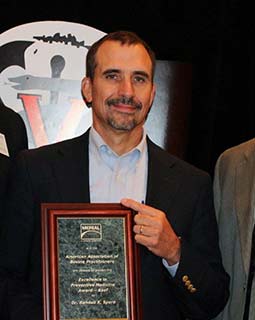 Prestigious
awards were given to seven bovine veterinarians at the American Association of
Bovine Practitioners 2013 Annual Conference in Milwaukee.
Prestigious
awards were given to seven bovine veterinarians at the American Association of
Bovine Practitioners 2013 Annual Conference in Milwaukee.
The highly coveted Bovine Practitioner of the Year award from the American Association of Bovine Practitioners (AABP) was given to Dr. Tom Latta of Spearman, Texas, at the 2013 AABP Annual Conference in Milwaukee, Wis. last week.
The award, sponsored by Boehringer Ingelheim Vetmedica, Inc., honors a veterinarian in active practice who is active in organized veterinary medicine and who has made significant contributions to bovine medicine.
Six other bovine veterinarians were also honored at the Annual Business Meeting and Lunch on Sept. 21. They are:
Merial Excellence in Preventive Medicine
This award recognizes individual member practitioners or practices that have developed outstanding preventive medicine programs. Because of differences in management goals and needs, one award is given to recognize an outstanding program for dairy production, and one for beef production. 2013 recipients are:
- (Dairy) Dr. Scott Tripp, Richmond, Utah
- (Beef) Dr. Randall Spare, Ashland, Kan.
AABP Award of Excellence
Sponsored by AABP, recipients must be involved in teaching, research, industry or government areas. The recipient’s professional activities must have had a consistent and direct influence on daily activities of veterinarians in bovine practice. The 2013 recipient is:
- Dr. Ken Nordlund, University of Wisconsin
Zoetis Distinguished Service Award
The recipient of this award is an individual who, through long and continued service, has promoted the goals of the AABP and whose accomplishments have served as a model for service to bovine agriculture through organized veterinary medicine. The 2013 recipient is:
- Dr. Robert Van Saun, Pennsylvania State University
Merck Animal Health Mentor of the Year Award
The recipient of this award is an AABP member who has been engaged in the field of veterinary medicine for at least 25 years and has served as both advisor and role model to pre-veterinary and/or veterinary students. This award is given to a member who embodies this spirit whether in practice, the clinic, or the classroom. The 2013 recipient is:
- Dr. Robert BonDurant, University of California-Davis
James A. Jarrett Award for Young Leaders
This award is for a deserving AABP member within 10 calendar years of graduation from veterinary school. Recipients will have given extraordinary service to the AABP in a manner that significantly enhances the mission of the organization. The 2013 recipient is:
- Dr. Ben Wileman, Willmar, Minn.
Cattle Production Veterinarian Hall of Fame
The Cattle Production Veterinarian Hall of Fame annually recognizes one beef and one dairy veterinarian for their lifelong commitment to bovine veterinary medicine. This award is sponsored by AABP, the Academy of Veterinary Consultants, Bovine Veterinarian, Merck Animal Health and OsbornBarr.
- (Dairy) Dr. Elmer Woelffer (deceased), Oconomowoc, Wis.
- (Beef) Dr. Don Williams, Colorado Springs, Colo.
AVC Earns Kansas Business and Professional Women's 2013 Small Business of the Year award
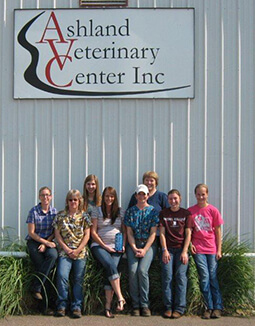 Ashland
Veterinary Center was recently honored by the Kansas Business and Professional
Women's organization as their 2013 Small Business of the Year! AVC was chosen
amongst other Kansas companies with 15 or less employees. Pictured are all of the
hard working women that keep AVC going strong. It truly is a team effort of both men
and women. AVC women credit the award to their co-workers and clients.
Ashland
Veterinary Center was recently honored by the Kansas Business and Professional
Women's organization as their 2013 Small Business of the Year! AVC was chosen
amongst other Kansas companies with 15 or less employees. Pictured are all of the
hard working women that keep AVC going strong. It truly is a team effort of both men
and women. AVC women credit the award to their co-workers and clients.
Veterinary Student Lacey Robinson Interns at AVC
Veterinary
student Lacey Robinson spent three weeks at Ashland Veterinary Clinic during the
summer of 2013. Lacey describes her time at AVC in southwest Kansas as an invaluable
learning experience. "The externship experience at AVC has exposed me to the many
facets of rural mixed animal practice. Whether it's treating a puppy with a
fractured limb or consulting a rancher on herd health issues, the team at AVC
strives to provide the highest level of care to all their patients and clients.
During my time here, I've had the opportunity to pregnancy check heifers using
ultrasound, assisted with breeding soundness exams on bulls, horse castrations, and
many procedures with small animals."
Lacey will begin her second year of veterinary school at Kansas State University's School of Veterinary Medicine in the fall of 2013. While a veterinary student, Lacey has served as an Upson Lecture Series Coordinator for the Food For Thought student organization, is a member of the College of Veterinary Medicine's Bovine Club and Therio Club, and is a student member of the Academy of Veterinary Consultants. She's also a graduate of NCBA's Masters of Beef Advocacy Program and member of the First United Presbyterian Church in Manhattan, Kansas. Lacey grew up on her family's beef cattle, horse and forage operation near Wellsville, Missouri.
Back to TopSuccess Breeds Success
By Jen Gillespie, Certified Angus Beef
CAB Partners
Here's a little insight on a group of Southwest Kansas Angus ranchers known for sourcing great replacement females all over the Plains. Veterinarian Randall Spare has a motto—"Success breeds success." And to run a successful cow herd, he believes in three essentials: nutrition, genetics, and animal health.
"To perform to the greatest degree, you have to make investments in all three things," he says. "If you have genetics and don't have good nutrition or good animal health, the genetic potential is not going to be expressed. Just as, using good genetics and good nutrition, if you don't use good animal health it will not allow cattle to perform like we know they are able."
These rocks are cornerstones for the Profit Proven group of commercial Angus producers from near Ashland, Kan. The alliance builds on their Gardiner Angus Ranch genetics with the brand promise of their name. As the resident veterinarian, Spare guides their health protocol: "We feel like, for the herds to perform, there has to be a basic animal health program. As a group, we agree on the basic premises, and then each ranch may do things a little bit differently according to their own management style."
Back to TopAVC Customer Appreciation Dinner
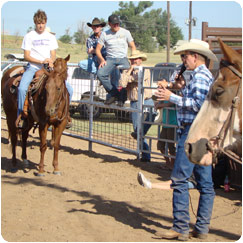 Every other year AVC
hosts an all-afternoon event to say “thanks” to our customers for their
patronage. The 2009 event was held in August here in Ashland. More than 325 folks
were treated to dinner. The following day, Shannon Hall, internationally know
cutting horse trainer from Loco, Oklahoma, conducted a horsemanship clinic at the
Clark County Fairgrounds. One of the nation’s best equine trainers shared his
knowledge with 20 participants and more than 30 spectators.
Every other year AVC
hosts an all-afternoon event to say “thanks” to our customers for their
patronage. The 2009 event was held in August here in Ashland. More than 325 folks
were treated to dinner. The following day, Shannon Hall, internationally know
cutting horse trainer from Loco, Oklahoma, conducted a horsemanship clinic at the
Clark County Fairgrounds. One of the nation’s best equine trainers shared his
knowledge with 20 participants and more than 30 spectators.
Whether you were in attendance or not, we appreciate and want to thank all our AVC customers.
Back to Top
